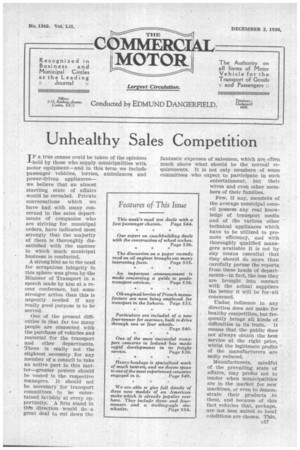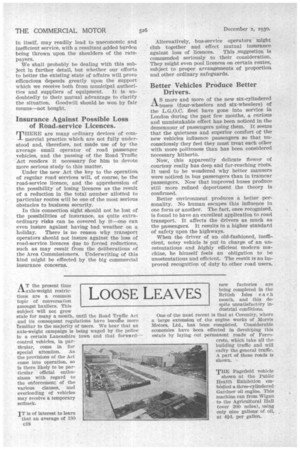Unhealthy Sales Competition
Page 39

Page 40

If you've noticed an error in this article please click here to report it so we can fix it.
TF a true census could be taken of the opinions -I-held by those who supply municipalities with motor equipment—and in this term we include passenger vehicles, lorries, ambulances and power-driven appliances— we believe that an almost startling state of affairs would be revealed. Private conversations which we have had with many concerned in the sales departments of companies who are striving for municipal orders, have indicated most strongly that the majority of them is thoroughly dissatisfied with the manner in which much municipal business is conducted.
A strong hint as to the need for scrupulous integrity in this sphere was given by the Minister of Transport in a speech made by him at a recent conference, but some stronger action than this is urgently . needed if any really good purpose is to be served.
One of the present difticuties is that far too Many people are connected with the purchase of vehicles and material for the transport and other departments. There is really not the Slightest necessity for any member of a council to take an active part in this matter—greater powers should be vested in the respective managers. It should not be necessary for transport committees to be entertained lavishly at every opportunity. A firm stand in thts direction would do a great deal to cut clown the fantastic expenses of salesmen, which are often much above what should be the normal requirements. It is not only members of some committees who expect to participate in such entertainment, but their wives and even other mem bers of their families.
Few, if any, members of the average municipal council possess any real knowledge of transport media and of the various other technical appliances which have to be utilized to promote efficiency, and with thoroughly qualified managers available it is not by any means essential that they should do more than carefully peruse the reports from these heads of departments—in fact, the less they are brought . into contact with the actual suppliers the better it will be forall concerned.
Undue influence in any direction does not make for healthy competition, but frequently brings all kinds of difficulties in its train, it means that the public does not always obtain , the best service at the right price, whilst the legitimate profits of the manufacturers are sadly reduced.
Manufacturers, -mindf at of the prevailing state of affairs,. may prefer not to tender when. municipalities are in the market for new machines, or even to demonstrate. their products . to them, and because of . this fact vehicles that, perhaps, are not best suited to local conditions are chosen. This, in itself, may readily lead to uneconomic and Inefficient service, with a resultant added burden being thrown upon the shoulders of the ratepayers. We shall probably be dealing with this subject in further detail, but whether our efforts to better the existing state of affairs will prove efficacious depends greatly upon the support which we receive both from municipal authori ties and suppliers of equipment. It is undoubtedly to their mutual advantage to clarify the situation. Goodwill should be won by fair means—not bought.
Insurance Against Possible Loss of Road-service Licences.
THERE are many ordinary devices of commercial practice which are not fully understood and, therefore, not made use of by the average small operator of road passenger vehicles, and the passing of the Road Traffic Act renders it necessary for him to devote more serious study to this matter. Under the new Act the key to the operation. of regular road services will, of course, be the road-service licence, and the apprehension of the possibility of losing licences as the result of a reduction in the total number allotted to particular routes will be one of the most serious obstacles to business security. In this connection sight should not be lost of the possibilities of insurance, as quite extraordinary risks can be covered by it—one can even insure against having bad weather on a holiday. There is no reason why transport operators should not insure against the loss of road-service licences due to forced reductions, such as may result from the deliberations of the Area Commissioners. Underwriting of this kind might be effected by the big commercial insurance concerns. Alternatively, bus-service operators might club together and effect mutual insurance against loss of licences. This .suggestion is commended seriously to their consideration. They might even pool licences on certain routes, subject to proper arrangements of proportion and other ordinary safeguards.
Better Vehicles Produce Better Drivers.
A S more and more of the new six-cylindered --buses (four-Wheelers and six-wheelers) of the L.G.O.C, fleet have gone into service in London during the past few months, a curious and unmistakable effect has been noticed in the demeanour of passengers using them. It seems that the quietness and superior comfort of the new vehicles influence passengers so that unconsciously they feel they must treat each other with more politeness than has been considered necessary hitherto. Now, this apparently delicate flower of courtesy really has deep and far-reaching roots. It used to be wondered why better manners were noticed in bus passengers than in tramcar passengers. Now that improved buses produce still more refined deportment the theory is confirmed.
Better environment produces a better personality. No human escapes this influence in one form or another. The fact, once recognized, is found to have an excellent application to road transport. It affects the drivers as much as the passengers'. It results in a higher standard of safety upon the highways. When the driver of an old-fashioned, inefficient, noisy vehicle is put in charge of an unostentatious and highly efficient modern machine, he himself feels an obligation to be unostentatious and efficient. The result is an improved recognition of duty to other road users,












































































































